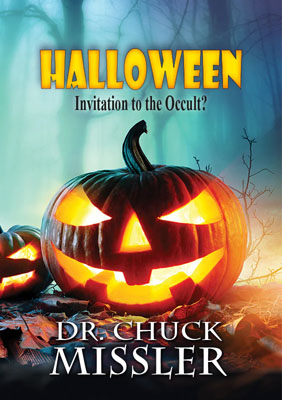One of the strangest episodes recorded in the Word of God is King Saul's consulting a witch (after having ostensibly cleansed the land of Israel from this occultic practice). The Halloween holiday seems like an appropriate time to review the implications of this puzzling tale.
Background
In his preoccupation with the pursuit of his rival David, King Saul had neglected the growing Philistine threat to Israel. The Philistines undertook a new strategy and marched into the Jezreel Valley where they could use their chariots to advantage, thus cutting Saul off from the northern tribes. (This same valley is destined to be the site of the future battle of Armageddon.)
David at this time was not only in the Philistine army, but had also been appointed the bodyguard for King Achish.1 David's ambiguous response to Achish regarding his participation in the war with Israel was a stall for time, anticipating God's deliverance from his predicament.
Samuel was dead. No encouraging word from the Lord would be forthcoming.2 Saul had removed all mediums from the land and those delving in the realm of the occult.3 (Have you ever discovered a "happy medium"?)
The Military Situation
The Philistines were encamped at Shunem, a city in the Valley of Jezreel situated on the south slope of the Hill of Moreh. The Israelite forces were camped five miles to the south at Mount Gilboa.4
Saul was so afraid that his heart "greatly trembled." He was gripped with fear.
Saul inquired of the Lord, but the heavens were silent. God did not respond by dreams as He had to Joseph, or by the Urim and Thummim as He had to the high priest, or by prophetic revelation as He had with Samuel.5
The Pursuit of the Occult
With the heavens silent, Saul sought out a medium to enable him to determine the outcome of the battle with the Philistines. Saul was informed by his servants that at Endor, between Mount Tabor and the Hill of Moreh, there lived a medium who had escaped his previous purges.6
The Old Testament law forbade occultic practices of any kind and called for the death penalty on any who would consult mediums.7 This would be fulfilled literally in the case of Saul himself.
Saul disguised himself and traveled under the cover of darkness to Endor to consult the medium. Assuring her that she would not be punished for practicing her forbidden profession,8 he requested that she bring up Samuel from the dead.9
The medium carried out Saul's instructions, but rather than using the tricks of her trade to deceive Saul, she herself was shocked to see an old man appear, whom Saul identified as Samuel!10
Alternative Views
Some have suggested that the appearance of Samuel was psychological - in the mind of Saul. However, the woman also saw Samuel, and Saul actually talked with Samuel.11
Some of the early church fathers held the view that a demon impersonated Samuel and appeared to Saul. But the message in 1 Samuel 28:16-19 would have hardly come from a demon.
Still others have concluded that the medium was a fraud and tricked Saul into thinking that he saw Samuel. Yet the medium was surprised herself by Samuel's appearance and that would not have been the case if it were a contrived trick.
The Rabbinical View
The traditional rabbinical view is that these verses record a genuine appearance of Samuel that God Himself brought about. There are at least five arguments that favor this view:
1)The medium was surprised, indicating that something happened that she was not expecting;12
2)Saul identified the figure as Samuel and bowed down in respect for the prophet. It is unlikely that Saul, who knew Samuel so well, would have been easily tricked by an impersonation;
3)The message that Samuel spoke was clearly from God;13
4)The Biblical text itself says that the figure was Samuel.14 It is clear that the intent of the Scripture is for the reader to understand that Samuel actually appeared to Saul.
5)A similar appearance of one returned from the dead occurred at the Transfiguration.15
The Prophet's Counsel
Samuel proceeded to remind Saul that the kingdom had been taken from him because of his disobedience in the Amalekite war, and then predicted Israel's defeat and the deaths of Saul and his sons at the hands of the Philistines. 16
Samuel never really answered Saul's initial question, "What should I do?" There was nothing that could be done. Because of his disobedience, his fate was sealed.
Saul was understandably terrified because of the message of doom that Samuel had communicated to him. Judgment was imminent and certain. All that had been Saul's as king would soon be lost because of his rebellion and contempt for God's will.
Having received some nourishment, Saul departed with his servants to return to the camp of Israel at Mount Gilboa.
The Defeat at Mount Gilboa
The battle was a disaster from the beginning. Saul's army was quickly routed, then slaughtered, including Saul's sons: Jonathan, Abinadab and Melchishua. The king himself was wounded by an arrow. In agony, Saul begged his armor-bearer to thrust him through with a sword but he refused. In desperation, Saul fell on his own sword and ended his life in ignominy. Ironically, Saul accomplished what David had refused to do - to take the life of the Lord's anointed king.
So great was Israel's defeat that many of the cities in northern Israel were abandoned as their citizens fled to regions safe from the Philistine menace. As a result, the Philistines were able to occupy many Israelite cities.
When Saul's body was found by the Philistines, they dishonored it by cutting off the head, stripping off the armor and hanging the naked body on a wall in the open square of Beth-Shean.17 The armor was put on public display in a temple.
The inhabitants of Jabesh-Gilead, whom Saul had helped early in his reign,18 at great risk removed the bodies from the wall of Beth-Shean and gave them a proper burial.19 A week of fasting as a sign of public mourning for the king was observed.
Saul appeared to be full of promise as a young man, but proved impulsive, prideful, and ended his own life in disgrace. The great failure of Saul as king was his lack of obedience to the will and Word of God. 20
A Halloween Project?
Every year, many Christians need help dealing with the children's celebrations surrounding Halloween. On the one hand, participating in the perpetuation of the usual pagan (and occultic) rituals are hardly the enterprise of a Biblical Christian.
For a Christian to celebrate Halloween is like asking a Holocaust survivor to celebrate Hitler's birthday. - Pat Matrisciana
On the other hand, creating constructive alternatives can be challenging. Many churches and families organize a "Harvest" festival with games, prizes, etc., as an alternative party opportunity. These are gaining widespread encouragement.
There is also an intrinsic appeal in organizing a drama event to involve teenagers, and one candidate for such an effort could be Saul and the Witch of Endor, as a play. (Several years ago, we held a play writing contest, and copies of the winning entries are available here for you to use.) There are four different treatments for your review and potential adaptation.
Notes:
- 1 Sam 28:1-2.
- 1 Sam 28:3.
- Deut 18:9-13; Ex 22:18; Lev 19:31.
- 1 Sam 28:4; cf. 31:1.
- 1 Samuel 28:6. The comment of the chronicler (1 Chr 10:14) is not a contradiction, but points to the fact that Saul went to the medium for counsel rather than persistently seeking a word from the Lord.) That was not a harsh or unjust act on God's part, for Saul had been given many opportunities to repent and discover God's Will, but he had refused to do so (cf. 1 Sam 19:23-24).
- 1 Samuel 28:3,7. The Hebrew phrase indicates a "mistress of necromancy," that is, one who consults the dead to determine the future.
- Lev 19:31; 20:6,27; Deut 18:10-11.
- Ex 22:18.
- 1 Sam 28:11.
- 1 Sam 28:14.
- vv. 12,15.
- 1 Sam 28:12.
- 1 Sam 28:16-19.
- 1 Sam 28:12,15,16.
- Mt 17:3.
- 1 Sam 28:17-19.
- 1 Sam 31:1-10; 1 Chr 10:1-10.
- 1 Sam 11:1-11.
- 1 Sam 31:11-13. Cremation was not a normal Hebrew practice (Gen 38:24; Lev 20:14; 21:9; Josh 7:25). In this instance, the bodies were probably burned and mutilated by the Philistines.
- 15:22-23.



